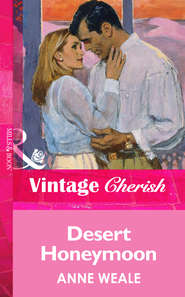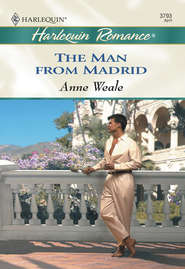По всем вопросам обращайтесь на: info@litportal.ru
(©) 2003-2024.
✖
The Youngest Sister
Автор
Год написания книги
2018
Настройки чтения
Размер шрифта
Высота строк
Поля
In contrast to her first impression of Majorca from the air, what struck her as they left the airport was the luxuriant blossom on the tall bushes lining the road. They looked rather like pale pink azaleas but she knew they were oleanders. The blue sky, the golden sunlight and these wonderful hedges, thick with flowers, combined to lift her spirits as if she were starting a holiday rather than being on a mission which might be fraught with problems.
She had thought that Nicolas would take the wheel, but he was in the front passenger seat, and from time to time he interrupted his conversation with Felió to turn and smile at her.
Usually when he did this Cressy would be gazing out of the window at the passing scene. But she always knew when he was looking at her and found it impossible not to return his smile. Each time he faced forward again she would have liked to continue looking at him, but she knew that if she did he would know it. She didn’t want him to guess she was far more interested in him than in the island’s hinterland.
She recognised that, although she had only just met him, she was in the grip of the most powerful physical attraction she had ever experienced. Everything about him was perfection and, to make matters worse—because she wasn’t comfortable with the feelings he aroused in her—his mind, as revealed in his books, was as pleasing as his person. Somehow she had the feeling that this was too good to be true, that there had to be a catch in it somewhere.
Neither of her sisters, who had everything going for them—brains, beauty, personality, wit—had been lucky in love. Why should she be? Except that she believed in love in a way that they no longer did and perhaps never had.
When they turned off the motorway where it was crossed by a minor road, she had a brief glimpse of a signpost indicating that Pollensa was seven kilometres further along the main road.
Not far along the side road the vehicle slowed down again to pass between massive stone pillars, one carved with the name Ca’n Llorenc.
Turning to her, Nicolas said, ‘In my Mallorquín grandfather’s time this was one of the largest estates in this part of the island. The main crops were almonds, oil and figs, but everything his family ate was grown or bred here. It was a self-sufficient community like the great estates in England. It could be still, if I wished it. But I prefer to travel, leaving the land in other hands.’
The drive was more like a farm track than the way to a great house. A long way ahead she could see the roofs of a number of buildings surrounded by what, at a distance, looked like giant feather dusters. Beyond them, in the distance, lay mountains, the farthest ones pale dovegrey in the afternoon light.
The track was flanked by ploughed land on one side and hay stubble on the other, with drifts of sky-blue wild flowers growing along the edges of the track.
Closer up, the feather dusters revealed themselves as date palms, with bunches of ripening orange-coloured fruit dangling among the branches. Then they passed through another stone gateway giving onto a large courtyard formed by the protruding wings of an old house built of rough stone with cut-stone lintels and sills above and below its many green-shuttered windows.
‘We’ll drop off Felió and my pack, and I’ll just say a quick hello to Catalina, and then we’ll go on to Miss Dexter’s place,’ said Nicolas. ‘While I’m gone, come and sit in the front.’
Cressy climbed out. After sitting still for several hours, she was glad of a chance to stretch and do a few limbering exercises. When the two men had disappeared, she put one hand over her shoulder and the other behind her back. With her fingers locked, she exerted the light pull needed to recover her normal flexibility.
The double doors leading into the shadowy interior of the house were shaded by the branches of an ancient vine trained over wires stretched between the wings of the building. In the centre of the courtyard stood a huge stone um, overflowing with brilliant red and pink geraniums. A well-fed black cat was drowsing in the shade of their leaves.
When Nicolas came back, Cressy was standing, storklike, on one leg, her other foot being held behind her to loosen her thigh muscles. Quickly she put it down and stood normally.
Behind him, lurking inside the doorway, wanting to see without being seen, was a woman in a print pinafore. Cressy smiled in her direction before turning and climbing back into the Range Rover.
‘You’re very supple,’ said Nicolas, sliding behind the wheel. ‘Are you a dancer as well as a rescuer of people in distress?’
‘Oh, no... I was just doing what your cat will probably do when he wakes up.’
‘He’s supposed to be a mouser,’ said Nicolas. ‘But Catalina feeds him. Sometimes he brings in a young bird, but he’s no threat to the mice.’
As they started back down the drive, Cressy said, ‘It’s incredibly good of you to go to these lengths for me. I’m sure you must be longing to have a cold shower and relax. How long have you been in transit?’
‘Around forty-eight hours, but I’m used to it. Jet lag doesn’t affect me any more. I can sleep anywhere.’
‘Where have you come from?’
‘I never talk about my trips until they’re in print.’ He took his eyes off the track to smile at her. The smile made his answer less of a snub than it might have sounded otherwise. ‘I find if I talk about places it saps some of my enthusiasm. I’ve heard novelists say the same about their stories.’
The remark made her wonder about his friends, and if they included many fellow writers and other creative people, artists and craftsmen, as well as men like himself who spent their lives doing adventurous things. She had a feeling his circle would be very different from that of her parents and sisters, for whom the twin peaks of achievement were power and money.
Sometimes Cressy felt so much like a changeling that she wondered if there could possibly have been a mixup at the expensive private clinic where she had been born. Not only was she physically unlike her sisters but she lacked their diamond-bright minds and their driving ambition. Nor, except in her size, was she like her father, a leading architect whose buildings she secretly disliked.
‘You look worried,’ said Nicolas. ‘Don’t be. I have nothing to do for the next few days. I’m happy to be your driver and interpreter.’
Cressy hadn’t realised that her face was reflecting her thoughts. Quickly brightening her expression, she said, ‘Is everyone in Majorca as helpful as you are? Is it a Majorcan characteristic?’
‘It’s a human characteristic, unless people have been corrupted by wretched living conditions in overcrowded cities. The islanders who work in the tourist resorts can sometimes be less than friendly, but most of the country people will try to be helpful.’ He had been watching the road as he spoke, but now, with a clear stretch ahead, he gave her a quizzical glance. ‘In any part of the world a girl with your looks doesn’t usually have any trouble drumming up help when she needs it.’
She didn’t know how to handle this. Compliments had come her way, but not often, and never from a man like Nicolas whose own looks were so compelling.
To her relief, he went on. ‘When you’re my size you sometimes feel like Gulliver in Lilliput...a giant in a world of mini people. My father was tall and my mother is tall for a Spanish woman. By the time I was fifteen, I was taller than everyone at Ca’n Llorenc. Teenagers are always self-conscious. For a few years I felt like a freak.’
‘Oh... so did I,’ she agreed, with deep feeling. ‘It’s all right for a boy to be tall, but for a girl it’s a pain. I used to hunch my shoulders, trying to look a bit shorter. But then I would be told off for bad deportment.’
‘Where did you go to school?’
She told him the name of her boarding school, wondering if he knew it was famous for academic excellence and the alma mater of many of Britain’s most brilliant female minds. She had been one of its failures.
‘Were you educated here?’ she asked.
‘No, I went to my father’s school in England.’ He brought the vehicle to a halt, giving way to a large flock of sheep coming in the opposite direction.
As they streamed by on both sides of the Range Rover Nicolas leaned out of the window and called a greeting to the shepherd. When only the back of his head and a quarter of his face could be seen, he looked very foreign. No Englishman ever had hair as black and springy as the thick, lustrous mass tied back at his nape, like the locks of an off-duty rock musician. All she could see of his face was the slanting line of his cheekbone, the forceful thrust of his jaw and his long neck.
It was impossible, now, to imagine him as a lanky adolescent, as unsure of himself as she had been at that age—and to some extent still was. Not with the people she worked with, but with her family and all their high-powered friends.
When the flock had gone past, bleating, Nicolas drove on until they reached a sandy by-way flanked by trees she recognised, from a family holiday in southern France, as olives.
They had travelled at least a mile along this meandering track when a small house came into view. It looked a ramshackle place, as did the various outbuildings. There was no garden around it, only olive trees and bare earth where some hens were scratching.
‘It looks closed up,’ said Cressy as they approached it on foot.
‘The shutters being closed doesn’t mean no one’s at home. The Spanish believe in keeping the sunshine out. The rooms stay cooler that way. But I would expect the door to be ajar, and it isn’t,’ said Nicolas.
A bell, which looked like a goat’s bell, was suspended beside the door. He pulled the string. When no one answered and no sound came from inside, he tried the handle. The door was locked.
‘It seems you were right. It is closed up. But someone’s keeping an eye on the place.’
‘How do you know?’
‘That goat has been milked today.’ He pointed towards a nanny goat standing tethered under a tree, chewing and staring at them with indifferent yellow eyes.
A moment later they heard a distant voice calling something Cressy couldn’t make out.
‘Someone’s coming,’ said Nicolas. ‘They must have seen us arriving from somewhere higher up the hill. This terrain might seem deserted but there’s always someone about. No one comes or goes without being noticed.’
They did not have long to wait before a small portly woman came hurrying round the side of the house. At the sight of Nicolas she broke into a torrent of Mallorquín, at the same time producing a large old-fashioned iron key from the pocket of the pinafore she was wearing over her dress.
When she finally paused for breath, Nicolas said, ‘This is Senora Guillot, who telephoned the bad news. I’ll explain to her who you are.’
When he had done this, the Spanish woman smiled and offered Cressy her hand. But, having observed the niceties, she turned back to him, clearly expressing concern.











